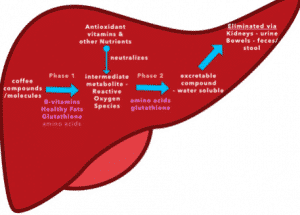Posts
What Your Reaction to Coffee Says about Your Liver and Why You Should Be Concerned
Olisa Mak, ND
I have a guilty pleasure: I love coffee, the smell of it, the bitter taste of it. Nothing wakes me up on a day off more than a fresh cup of dark roast coffee. I usually drink anywhere from two to four cups of coffee a week, but never more than one a day. Yesterday, I drank two cups of coffee, a latte that was quite strong and a dark roast two hours apart. The effect? A coffee overdose. For the rest of the day, I was restless, experienced chest pains, had chattering teeth, hands that were shaking, a headache and was unable to sleep. I was buzzed and overly stimulated. It wasn’t until five in the morning, roughly 14 hours after my second cup of coffee, that I stopped feeling the buzz. Although, this morning, I woke up feeling completely hungover like I had a night out drinking.
Although most people do not experience such an extreme reaction, it isn’t uncommon to hear people say that they can’t handle coffee, that they feel “jittery” after drinking it. On the other end of the spectrum, there are people who simply do not feel anything after drinking coffee; they can have several cups a day with no after effects.
So what does all of that mean? Why do some people, like myself, have such extreme reactions to coffee whereas other people feel nothing?
First we have to understand how coffee is metabolized in the body. When we drink coffee, it reaches our digestive tract where the coffee is modified and individual chemical constituents of coffee are absorbed by our small intestines. Once in the small intestines, the various chemical compounds found in coffee are absorbed and circulate throughout the bloodstream and reach the liver and other organs.
The liver metabolizes coffee in a step-wise manner and in each step, the compounds are chemically modified to become more and more water-soluble, to ensure proper elimination by the kidneys and bowels. here are two general steps in the liver detoxification process, which I’ll call phase one and two. When you’re overly sensitive to coffee, your phase one is sluggish whereas if you don’t feel anything from coffee, your Phase one is too active.
So how can you bring these two steps back into balance? If you’re overly sensitive to coffee, you need to give your phase one a boost. Phase one relies mainly on B vitamins (amongst other nutrients) whereas phase two mainly relies on amino acids from protein sources like good quality meat and fish. A diet abundant in colorful fruits and vegetables, rich in vitamins is key. There are also supplements that have been especially formulated to support liver function when changing your diet isn’t enough. Certain foods, especially cruciferous vegetables like kale, cabbage, broccoli and Brussels sprouts, are also great for giving your phase one a boost. If your phase one is overactive and you don’t feel anything from coffee, then you need to slow down phase one. You can do this with herbs, such as Calendula officinalis, or spices such as turmeric (in a supplement form it is sold as curcumin).
Other than feeling “jittery” after drinking coffee, why is it important to correct an imbalance between the two phases? At the end of phase one, reactive oxygen species are produced. If phase one is overactive or faster than the phase two pathway, you ultimately get an accumulation of reactive oxygen species because your phase two just can’t keep up with phase one. Reactive oxygen species are chemically reactive molecules known to cause inflammation and damage throughout the body, including cellular DNA damage. Reactive oxygen species or high oxidative stress have been implicated in chronic conditions including cancer, diabetes, atherosclerosis and aging, Having signs of an imbalance between both phases has long term consequences and should be addressed.
Figure 1. Your liver and Phase 1 and Phase 2.

Diagram created by Dr. Olisa Mak
Although the body naturally produces reactive oxygen species, the body has protective mechanisms in place to protect itself. By eating a diet rich in antioxidants such as vitamin C, zinc and thiols (e.g., NAC) which can be found in garlic, onions and cruciferous vegetables, the body neutralizes these harmful, reactive oxygen species.
The balance between both phases is important to understand as it plays a key role in the metabolism of everything that our bodies comes into contact with—not just coffee but alcohol, medications, supplements, pesticides on our foods, even chemicals we absorb through our skin from personal health care products. The rate at which these two phases function ultimately defines how well our liver protects us from everything that we are exposed to. The chronic illnesses associated with high oxidative stress may not appear right away but ultimately affect our ability to live healthy and happy lives. Love your liver by eating a well-balanced, organic diet, rich in antioxidants and nutrients.
My ordeal from drinking only two cups of coffee one after the other brought to my attention the imbalance between my liver’s phase one and phase two. I too will examine my diet and find a way to improve my liver’s functioning. Will you?
If you’re concerned about your liver function, book an appointment to see how your liver function can be improved. Make better, more informed, decisions about their health. Come in for an appointment and get started with an individualized treatment plan just for you.
Dr. Olisa Mak ND is at Inspirit Clinic in Yaletown, Vancouver, BC.





